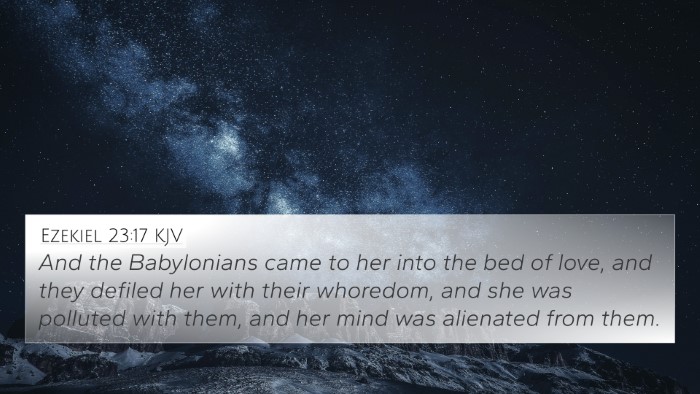Understanding 2 Samuel 13:15
Verse: 2 Samuel 13:15 - "Then Amnon hated her exceedingly, so that the hatred wherewith he hated her was greater than the love wherewith he had loved her: and Amnon said unto her, Arise, be gone."
This verse narrates a tragic moment in the life of Amnon, King David's son, who succumbed to his basest desires and ultimately rejected the woman he once claimed to love. This juxtaposition of love and hatred provides rich ground for analysis and deeper understanding.
Key Themes and Insights
- Duality of Emotions: The swift transformation from love to hate is alarming and points to the human capacity for conflicted feelings. Commentary from Matthew Henry emphasizes this radical shift to demonstrate how unchecked desires can lead to devastating emotional consequences.
- Consequences of Sin: Albert Barnes notes that Amnon’s actions stem from lustful desires that culminate in violence and betrayal. His hatred post-incident highlights the destructive nature of sin—bringing forth not only immediate damage but long-lasting emotional scars.
- Rejection and Isolation: Amnon’s command to “arise, be gone” suggests a complete rejection of Tamar, forcing her into isolation. Adam Clarke reflects on how this act reflects the abandonment of moral obligation towards others, especially those whom we claim to love.
Cross-References and Thematic Connections
This verse aligns with several other biblical texts that explore themes of love, lust, and the resulting consequences. Below are bible verses that relate to each other with context to 2 Samuel 13:15:
- Genesis 34:2: The story of Shechem and Dinah showcases similar themes of desire leading to violation and subsequent shame.
- Proverbs 6:32-33: A warning against adultery and its repercussions, echoing the futility of lust as seen in Amnon’s actions.
- James 1:14-15: Describes how desire can lead to sin, completing the cycle of desire, sin, and ultimately death—a relevant warning for Amnon.
- 1 John 2:15-17: Advises against love of the world, aligning with the spiritual implications of Amnon's earthly passions.
- Matthew 5:28: Jesus teaches that even looking with lust qualifies as sin, elucidating the gravity of inward desires that Amnon succumbed to.
- Romans 7:5: Explains how sin exploits desires, thereby leading to death—similar to Amnon’s tragic decline into sin and hatred.
- Ephesians 4:31: Urges believers to put away bitterness and wrath, in stark contrast to Amnon's choices that resulted in personal and relational tragedy.
Lessons for Today
2 Samuel 13:15 unfolds realities of human emotions and highlights the importance of self-control and moral responsibility. The consequences of Amnon’s choices serve as a grave reminder of what can transpire when lust overcomes reason and honor.
By understanding these connections between Bible verses, readers are encouraged to employ bible cross-reference systems to gain deeper insights into similar themes across the scriptures.



